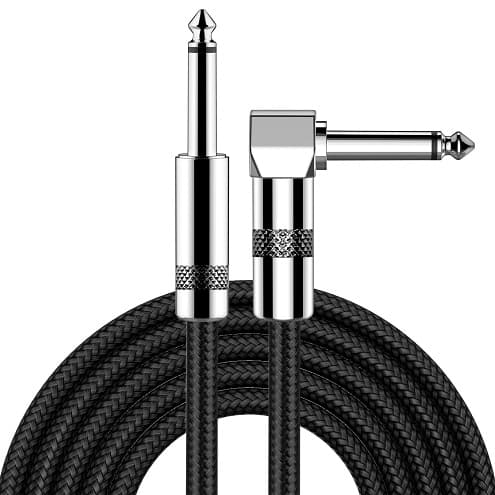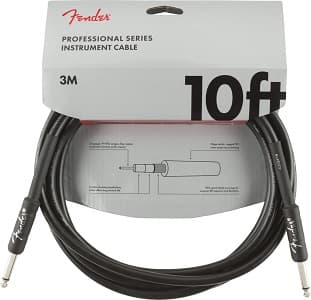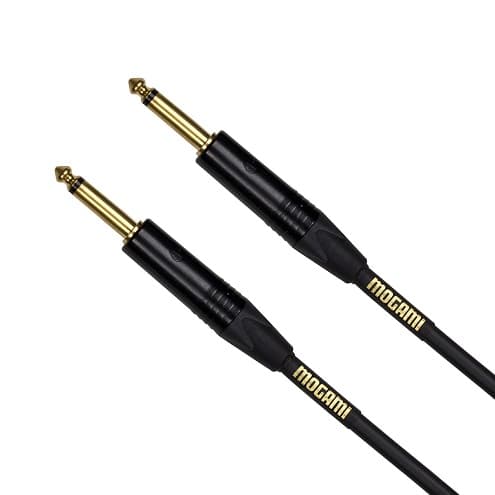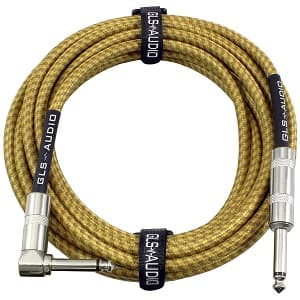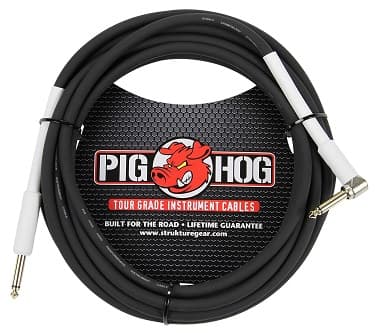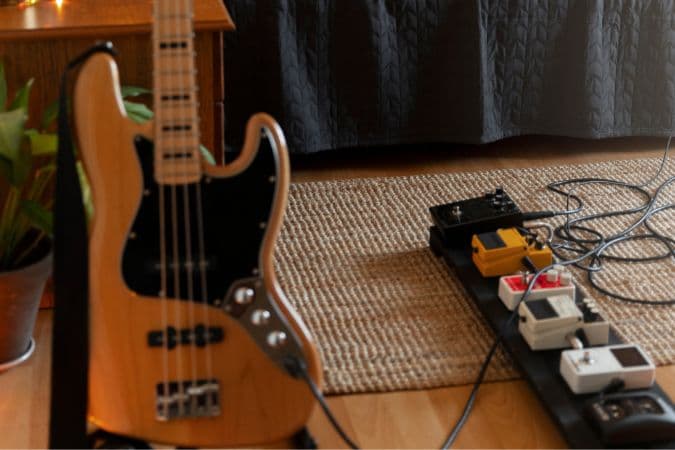
When guitarists think of enhancing the tone and reliability, they concentrate on guitar amps or pedals, in addition to the guitar. But it’s also true that the best guitar cables also play an important role.
Needless to say, causing noise, ruining the clarity of your tone, and even causing mid-range performance to fail can occur due to a poor-quality cable. In reverse, you can enjoy a strong and interference-free sound through a well-constructed cable.
In this guide, you will be able to understand why guitar cables become crucial and the reasons that affect their performance. Also, you will learn how to pick the right one according to your needs.
Why the best Guitar Cables Are Important
Many think that a guitar cable is only a simple wire. But the reality is that it is the anatomical connection between your guitar and the remaining signal chains. Honestly, a poor connection in the chain might cause the following problems:
- Your device may lose high frequencies for capacitance build-up over distance.
- The instrument may experience unexpected hum and buzz from faulty connectors or poor shielding.
- The signal of your guitar can degrade in long cable runs.
- If your cable fails on the stage, you can get frustrated on the stage.
Regardless of whether in the recording studio or on stage, you will enjoy reliability, consistency, and clarity through a quality cable whenever and wherever you play.
Top 5 Best Guitar Cables Reviews
1. New Bee Guitar Cable 10ft Electric Instrument
This model from New Bee is designed for those seeking an affordable and reliable cable with clear sound transmission.
The brand has manufactured it with high-quality ingredients. So it confirms the lowest signal damage and intervention. Also, for both practice and live performances, this model produces a pure melody.
While playing, its robust connectors ensure a secure fit to minimize the risk of accidental disunion. Besides, it is easy enough to manage and store without knots.
One of the notable features is that it is compatible with guitars as well as bass and other instruments.
Pros:
- Flexible and durable build
- Noise-free and clear signal transmission
- Affordable price
Cons:
- It might not be suitable for a heavy professional journey.
2. Fender Professional Series guitar Cable (990820024)
You long for a cable with clear sound and lasting durability. Okay, this Professional Series from Fender is for you.
Fender has built it using high-grade materials, so it offers a fantastic signal transfer without unwanted noise and interference. Also, it is thick and flexible to defend it from tangles and twists.
The company uses straight-to-straight connectors to secure the connection and resist accidental unplugging while playing intensively. Overall, you can depend on it because it performs professionally.
You can think it is slightly costlier than the previous one. But its performance will make your investment effective.
Pros:
- Durable construction
- Less noise intervention
- Brilliant sound
Cons:
- It might seem a bit thick.
3. Mogami Gold Guitar Cable Instrument 10
Money doesn’t matter. But the only thing that matters is quality, exceptional tone, and reliability. Okay, the Mogami has introduced the Gold Instrument 10 Guitar Cable, which is compatible with your needs.
You don’t like unwanted noise and interference but love a clean, natural sound. To minimize unwanted noise and interference and ensure a natural and clean sound, the brand uses ultra-high-quality shielding.
This item provides a consistent signal with outstanding clarity. It is too durable because the gold-plated connectors improve conductivity and resist corrosion.
Pros:
- Superior for long-term use
- Minimal signal loss with lovely performance
- Excellent for stage use and studio
Cons:
- Too pricey compared to other standard cables
4. GLS guitar Cable
This time, we’ve come up with an electric guitar cable. It’s a 20ft cable, so you can use it for long-distance performance.
Since the company has manufactured the product using high-grade ingredients, it provides consistent and clear audio with the lowest intervention.
Besides, the product adds an oxygen-free copper core to confirm a powerful signal, so it becomes an automatic choice for keyboards, basses, electric guitars, and other instruments.
The product features a solid construction and sturdy metal connectors. As a result, you can use it for the long term. Also, you will find a balance in this model between price and performance.
Pros:
- Stiff rubber jacket for additional protection
- Crystal-clear and noise-free sound transmission
- Sturdy metal connectors
Cons:
- Someone has complained about its jacks.
5. Pig Hog Guitar Cable (PH10R)
Do you long for a cable that is cheap in price but performs well? In truth, the Pig Hog PH10R is now on the market to meet your demand.
The PH10R features a stiff and dependable design for long-term use. Also, it has a high-quality 8mm jacket to protect it from damage, so it becomes ideal for musicians.
The PH10R produces a balanced and clean sound with low noise and signal drops. It is a 10ft cable, so movement on the stage or in the studio becomes comfortable.
The negative side is that the PH10R is somewhat solid, so it becomes less supple to pack or coil. Plus, it is somewhat bulky compared to standard ones. Consequently, it might not be suitable for touring musicians.
Pros:
- Built for long-term use
- Best audio quality
- Ideal length for various uses
Cons:
- Somewhat rigid to handle
Knowing About the Best Guitar Cables Components
Understanding the basic parts and performance of cables will aid you in choosing the right cable.
1. Shielding
Like radio frequencies or electrical interference from entering your signal, shielding resists outside noise. See common types:
- Spiral shielding: This type is malleable, which is best for pedalboards or short runs.
- Braided shielding: It provides excellent noise rejection. But it is a bit stiff.
- Foil shielding: Usually, you’ll find it in inexpensive cables, which are less durable.
Note that the superior cables frequently blend two types of shielding for the highest safety.
2. Conductors
The signal from your instrument is carried through the center of the cable. Manufacturers utilize oxygen-free copper or similar premium materials for high-quality cables to get better conductivity and lower resistance.
- Standard copper: This type is popular for durability and affordability. Indeed, it is suitable for most musicians.
- Silver-plated copper: It delivers a brilliant tone but at a higher price.
3. Connectors
The cables’ edges become crucial, like the wire itself. You’ll find the two most common types. These are:
- Right-angle connectors: These types become ideal for guitars, which have side-mounted jacks or tight pedalboard setups.
- Straight connectors: Many consider the standard plug for most amps and guitars.
Plating alternatives incorporate gold (corrosion-resistant) and nickel (durable and affordable).
4. Insulation
Insulation encompasses the conductor. Also, it detaches from the shield. In truth, standard insulation lessens microphonic noise. It lessens the unwanted “rattling” or “clicking” noises when a wire bends or moves.
Main Factors That Influence Tone
Below are the main factors that influence the sound.
1. Length
If the wire is too long, the total capacitance and the possibility of tone degradation increase.
- Over 30 feet: You think about a very low-capacitance cable or buffer pedal.
- 20-25 feet: Look for slight high-end roll-off.
- Less than 15 feet: It causes minimal tone change for most setups.
Note: Use the shortest cable length that suits your needs.
2. Capacitance
Capacitance means the tendency of a wire to store electrical energy, which is gauged in pico-farads per foot (pF/ft).
- High capacitance: It features a warmer tone with a slight high-end roll-off.
- Low capacitance: It has a clearer tone and stores high frequencies.
For active pickups or buffered pedalboards, Capacitance is less sensitive. In reverse, you’ll notice a remarkable effect of Capacitance for passive pickups.
Suggestion: Consider a lower-capacitance cable if you notice that your tone sounds dull or muddy, especially with longer cables.
3. Durability
Like bending, stepping, coiling, and uncoiling, wires undergo considerable pressure. So, explore the following features:
- Supple design that prevents cracking and tangling.
- Strong strain relief near connectors.
- Hefty-duty outer jacket material.
Picking the Best Guitar Cables for Your Setup
Every musician has different needs. We have highlighted different situations. Now, check out what situation matches you.
For Home Practice:
- Pick a length of about 10-15 feet.
- Concentrate on flexibility and less handling noise.
- A standard and medium-quality cable functions properly.
In the Recording Studio:
- Emphasize low capacitance for the highest clarity.
- To avoid interference from studio equipment, quality shielding will be crucial.
- To retain noise at a minimum, shorter cables (under 15 feet) will be better.
For Live Performance:
- To resist accidental unplugging, think of right-angle connectors.
- You might need longer cables. Therefore, low capacitance is more crucial.
- Opt for durable cables, which have rugged jackets.
For Pedalboards:
- Utilize short and flexible patch wires between pedals.
- For very short runs, noise immunity becomes less crucial. But better connectors become significant.
How to avoid common mistakes when choosing the best guitar cables
- Purchasing based only on price: Usually, the cheapest cable frequently causes noise or fails quickly.
- Avoiding shielding: Especially under stage lights, poor shielding results in buzzing.
- Extra-long cable: Overly long cables can unnecessarily reduce the tone.
- Not checking before gigs: To avoid on-stage failures, always check cables.
How to Maintain Your Guitar Cables
Over the years, a quality cable can last with proper care. We’ve given some tips below for lasting a cable.
- If you want to avoid fraying, you coil the cables using the over-under method.
- You keep connectors clean and corrosion-free.
- Store them in a cool and dry place when you do not use them.
- To detect lengths and purposes effortlessly, label the cables.
FAQs About The Best Guitar Cables
Q: Are expensive cables better for the sound?
A: It is not always right. Indeed, you can enjoy better service from a mid-range cable with good shielding and low capacitance, like premium cables. Price frequently gleams durability and brand reputation.
Q: How can I detect a bad cable?
A: Notice signs such as occasional crackling, sound disappearing when touching metal, or complete signal loss. So, for quick troubleshooting, always carry an extra cable.
Q: Do gold-plated connectors work the best?
A: Than nickel, gold prevents corrosion better. But it does not necessarily enhance tone. Gold-plated connectors become most effective in humid environments or for cables that are rarely used.
Q: May I mend a broken wire?
A: Sure, if you possess fundamental soldering skills. Most often, the issue lies with the connector. It is possible to fix it with a simple resolder.
Conclusion: Best Guitar Cables
In general, you may consider a guitar cable as a simple matter. But it directly impacts your playing experience and tone. Therefore, considering factors such as capacitance, shielding, and durability, opt for a wire that meets your needs.
You can Visit Here To Check Out Guitars:
